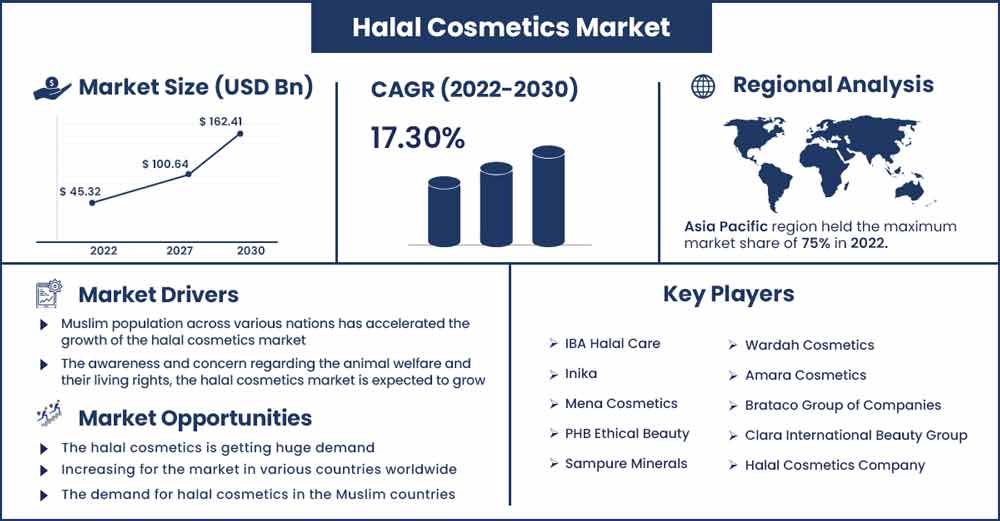Halal Cosmetics Market Will Hit 17.3% Growth Through 2030
The global halal cosmetics market size surpassed USD 45.32 billion in 2022 and is predicted to touch around USD 162.41 billion by 2030, growing at a remarkable CAGR of 17.3% between 2022 and 2030.

These products do not contain any animal-derived products and they are labeled halal according to Islamic law. Halal cosmetics are extremely famous in Muslim countries and the trend for these cosmetics has led to an increase in the demand for these products in non-Muslim countries also. As they are free from any animal cruelty and do not involve any ingredients that are derived from animals they are preferred even by the non-Muslim communities.
The trend for vegans and vegetarianism has also led to the growth and expansion of halal cosmetics products. There is an increased awareness about the benefits of using these halal cosmetics. These products are extremely safe for use and do not have any side effects as they are made in extremely hygienic conditions and packed safely. Halal cosmetics initially offered only a few products for the personal of Muslim women but in recent years the market has changed and the demand for grooming and makeup products is also rising. These products are certified halal but at times the ingredients of these products are not mentioned clearly.
Report Highlights:
- On the basis of the product type segment, Personal care products have the largest market share. The market for personal care products is growing due to an increase in the demand for products related to personal hygiene and religion of observances. The extensive product portfolio of halal cosmetics have led to an increase in the consumption of these products.
- On the basis of application, the hair care segment is expected to grow during the forecast. The desire for healthy hair has led to growth in this market. It offers many products like hair oil, hair shampoo, hair conditioner, hair massage creams, hair gels, etc.
- On the basis of the distribution channel, the offline segment has grown. In recent years and it is expected to grow well during the future. There are various brand stores that offer all halal cosmetics in various domains. Post-pandemic, the online stores for halal cosmetics have also seen growth. As the demand for halal cosmetics is increasing even in non-Muslim countries, online stores are able to meet these demands.
Halal Cosmetics Market Report Scope:
| Report Coverage | Details |
| Market Revenue in 2023 | USD 53.16 Billion |
| Projected Forecast Revenue in 2030 | USD 162.41 Billion |
| Growth Rate from 2022 to 2030 | CAGR of 17.3% |
| Largest Market | Asia Pacific |
| Base Year | 2022 |
| Forecast Period | 2022 To 2030 |
| Regions Covered | North America, Europe, Asia-Pacific, Latin America, and Middle East & Africa |
Market Dynamics:
Drivers:
The increase in the Muslim population across various nations has accelerated the growth of the halal cosmetics market. The trend of veganism has resulted in boycotting animal-based products. Also, the awareness and concern regarding animal welfare and their living rights, the halal cosmetics market is expected to grow. The younger generations are conscious consumers and they are increasingly spending on halal products.
Restraints:
Halal cosmetic products are made in extremely hygienic conditions and the ingredients used in the manufacturing process are slightly more expensive than those that are conventionally used. The packaging of the products are also done by keeping the hygiene in mind. The entire cost of producing halal cosmetics goes high due to all of these norms. Therefore the cost of these products is also high, which hinders market growth. The certification process for halal cosmetics is not standardized, and this factor also happens to restrain the growth of the market.
Opportunities:
The market for halal cosmetics is getting huge demand. The market is gaining popularity and hence the opportunities are increasing for the market in various countries worldwide. The demand for halal cosmetics in the Muslim countries was always good, but in the recent years the non Muslim countries are also adopting the halal cosmetics. There's a growing demand for using these cruelty free cosmetics for the welfare of the animals, all of these reasons are creating new opportunities for the halal market growth.
Challenges:
The certification for halal products are provided to the companies but there is not standardized. This happens to be a major challenge in the growth of this market. Halal cosmetics have a great competition from other organic and natural products.
Recent Developments:
- In order to cater to a diverse consumer base for the halal products across many nations a halal brand was launced by the ex- employees of L’oreal in August 2020.
- In June 2021 Novel halal sanctioned skin care products was presented by a muslim possessed skin care brand Flora and Noor . This company offers many halal products that are cruelty free, vegan and also halal approved, they also produce toners, serums, cleansers, body scrubs, bath bombs and moisturizers and increase the products portfolio.
- Boozer, which is a Brazilian cosmetics company that is located in Amazon region has a varied range of products called Simbioze Amazonica and these products have received halal certification in December 2019.
Major Key Players:
- IBA Halal Care
- Inika
- Mena Cosmetics
- PHB Ethical Beauty
- Sampure Minerals
- Wardah Cosmetics
- Amara Cosmetics
- Brataco Group of Companies
- Clara International Beauty Group
- Halal Cosmetics Company
Market Segmentation:
By Product Type
- Personal Care Products
- Color Cosmetics
- Fragrances
By Application
- Skin Care
- Face Care
- Hair Care
- Beauty Care
By Distribution Channel
- Offline
- Online
Buy this Research Report@ https://www.precedenceresearch.com/checkout/2350
You can place an order or ask any questions, please feel free to contact at sales@precedenceresearch.com | +1 9197 992 333